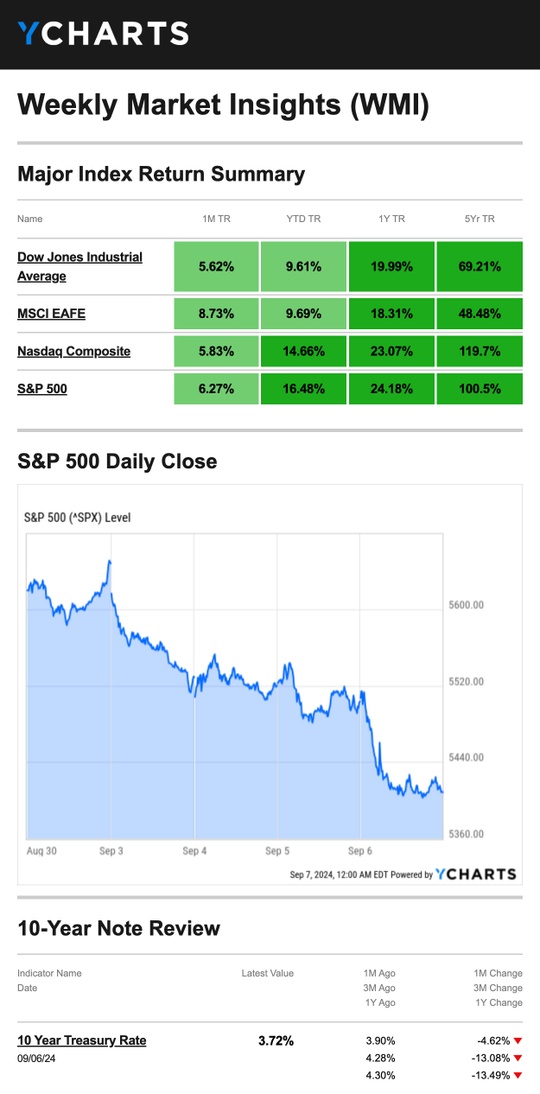Stocks fell last week as soft economic data rattled investors focused on the Fed’s next move with interest rates.
The Dow Jones Industrial Average lost 2.93 percent, while the Standard & Poor’s 500 Index dropped 4.25 percent. The tech-heavy Nasdaq Composite fell 5.77 percent. The MSCI EAFE Index, which tracks developed overseas stock markets, declined 2.91 percent.1,2
Economic Data Unsettles Investors
The four-day trading week got off to a rough start as weak manufacturing data reawakened recessionary fears. All three major averages were down for the first session after the Labor Day holiday. For many, it was reminiscent of August 5, when stocks tumbled as recession worries unsettled investors.3
Attention shifted to Friday’s jobs report as stocks traded narrowly. Markets initially reacted positively to news that job growth rebounded slightly and unemployment ticked down. However, selling pressure increased as the trading session progressed and investors digested the underlying data. The S&P 500 had its worst week since March 2023.4


Source: YCharts.com, September 7, 2024. Weekly performance is measured from Friday, August 30, to Friday, September 6. TR = total return for the index, which includes any dividends as well as any other cash distributions during the period. Treasury note yield is expressed in basis points.
Focus on Fed’s September Meeting
The Federal Reserve seems poised to make a tough decision regarding monetary policy in its September meeting. The jobs market and other softening economic data have quickly overshadowed concerns about inflation.
However, there’s still a case to be made for a soft landing.
Job growth in August was slower than expected, but 142,000 jobs were created–an uptick that some would argue is an overall positive despite missing expectations. The drop in the unemployment rate to 4.2 percent bolstered the soft-landing narrative.5
Market observers anticipate a 0.25 percent rate adjustment in September, but some contend that the Fed may consider a more significant move. On Friday, Fed Governor Christopher Waller said he was open to a larger move if necessary. Chicago Fed President Austan Goolsbee and New York Fed President John Williams commented similarly during the week.6,7
This Week: Key Economic Data
Monday: Wholesale Inventories. Consumer Credit.
Wednesday: Consumer Price Index (CPI). EIA Petroleum Status Report.
Thursday: Producer Price Index (PPI). Jobless Claims (weekly).
Friday: Consumer Sentiment. Import and Export Prices.
Source: Investors Business Daily – Econoday economic calendar; September 6, 2024
The Econoday economic calendar lists upcoming U.S. economic data releases (including key economic indicators), Federal Reserve policy meetings, and speaking engagements of Federal Reserve officials. The content is developed from sources believed to be providing accurate information. The forecasts or forward-looking statements are based on assumptions and may not materialize. The forecasts also are subject to revision.
This Week: Companies Reporting Earnings
Monday: Oracle Corporation (ORCL)
Tuesday: GameStop Corp. (GME)
Thursday: Adobe Inc. (ADBE)
Source: Zacks, September 6, 2024
Companies mentioned are for informational purposes only. It should not be considered a solicitation for the purchase or sale of the securities. Investing involves risks, and investment decisions should be based on your own goals, time horizon, and tolerance for risk. The return and principal value of investments will fluctuate as market conditions change. When sold, investments may be worth more or less than their original cost. Companies may reschedule when they report earnings without notice

“Give what you have to somebody; it may be better than you think.” –Henry Wadsworth Longfello

Tax Tips on Identity Theft
Here are a few things that may help you against identity thieves:
The Internal Revenue Service (IRS) never will contact you via email or phone to request personal information. If you receive a scam email or call that claims to be from the IRS, report it to phishing@irs.gov.
People can steal your identity by stealing your wallet or purse, receiving the information they need over the phone or email, finding your personal information in the trash, or accessing information you provide to an unsecured website (only enter credit card information on websites that start with “http://”).
If you receive a letter from the IRS indicating that more than one tax return was filed in your name, your identity may have been stolen.
This information is not a substitute for individualized tax advice. Please discuss your specific tax issues with a qualified tax professional.
Tip adapted from IRS.gov8

4 Potential Health Benefits of Coffee
- Coffee may help you live longer: Recent studies found that coffee drinkers are less likely to die from some of the leading causes of death, including coronary heart disease, stroke, diabetes, and kidney disease.
- Your liver may thank you: Research shows that coffee drinkers are more likely to have liver enzyme levels within a healthy range than people who don’t drink coffee.
- You may decrease your risk of getting Alzheimer’s disease: The caffeine in two cups of coffee may protect against developing the condition. Researchers found that women aged 65 and older who drank two to three cups of coffee a day were less likely to develop dementia in general.
- Your body may process glucose better: Studies found that people who drink more coffee are less likely to get type 2 diabetes.
Tip adapted from John Hopkins Medicine9


Icebergs on the Jokulsarlon glacial lake
Jökulsárlón Ice Beach, Vatnajökull National Park, Iceland
Footnotes and Sources
1.The Wall Street Journal, September 6, 2024
2. Investing.com, August 30, 2024
3.The Wall Street Journal, September 3, 2024
4.The Wall Street Journal, September 6, 2024
5.The Wall Street Journal, September 6, 2024
6.Marketwatch.com, September 5, 2024
7.CNBC.com, September 6, 2024
8.IRS.gov, May 8. 2024
9.Hopkinsmedicine.org, May 8. 2024
Investing involves risks, and investment decisions should be based on your own goals, time horizon, and tolerance for risk. The return and principal value of investments will fluctuate as market conditions change. When sold, investments may be worth more or less than their original cost.
The forecasts or forward-looking statements are based on assumptions, may not materialize, and are subject to revision without notice.
The market indexes discussed are unmanaged, and generally, considered representative of their respective markets. Index performance is not indicative of the past performance of a particular investment. Indexes do not incur management fees, costs, and expenses. Individuals cannot directly invest in unmanaged indexes. Past performance does not guarantee future results.
The Dow Jones Industrial Average is an unmanaged index that is generally considered representative of large-capitalization companies on the U.S. stock market. Nasdaq Composite is an index of the common stocks and similar securities listed on the NASDAQ stock market and is considered a broad indicator of the performance of technology and growth companies. The MSCI EAFE Index was created by Morgan Stanley Capital International (MSCI) and serves as a benchmark of the performance of major international equity markets, as represented by 21 major MSCI indexes from Europe, Australia, and Southeast Asia. The S&P 500 Composite Index is an unmanaged group of securities that are considered to be representative of the stock market in general.
U.S. Treasury Notes are guaranteed by the federal government as to the timely payment of principal and interest. However, if you sell a Treasury Note prior to maturity, it may be worth more or less than the original price paid. Fixed income investments are subject to various risks including changes in interest rates, credit quality, inflation risk, market valuations, prepayments, corporate events, tax ramifications and other factors.
International investments carry additional risks, which include differences in financial reporting standards, currency exchange rates, political risks unique to a specific country, foreign taxes and regulations, and the potential for illiquid markets. These factors may result in greater share price volatility.
Please consult your financial professional for additional information.
This content is developed from sources believed to be providing accurate information. The information in this material is not intended as tax or legal advice. Please consult legal or tax professionals for specific information regarding your individual situation. This material was developed and produced by FMG Suite to provide information on a topic that may be of interest. FMG is not affiliated with the named representative, financial professional, Registered Investment Advisor, Broker-Dealer, nor state- or SEC-registered investment advisory firm. The opinions expressed and material provided are for general information, and they should not be considered a solicitation for the purchase or sale of any security.
Copyright 2024 FMG Suite.